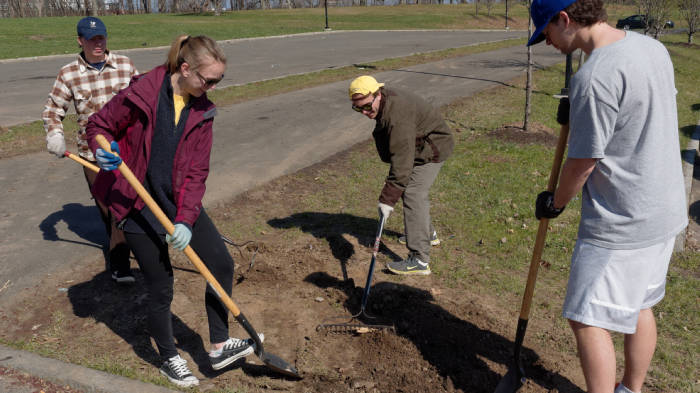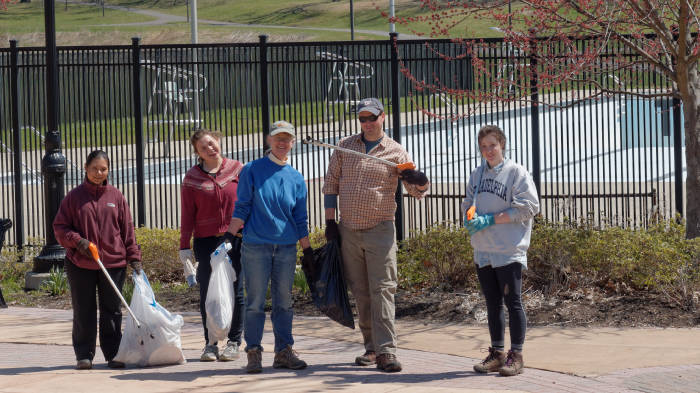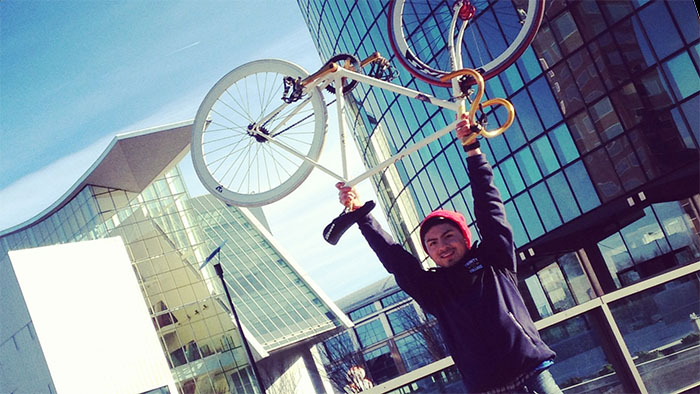… one heck of a final exam in biological invasions.
Monthly Archives: April 2014
Pope Park Clean-up
 On April 19th about twenty ENVS students volunteered their time to clean up a portion of Pope Park. We met at McCook Hall at around 9AM and headed down to the site, where the Friends of Pope Park welcomed us with an impressive breakfast buffet.
On April 19th about twenty ENVS students volunteered their time to clean up a portion of Pope Park. We met at McCook Hall at around 9AM and headed down to the site, where the Friends of Pope Park welcomed us with an impressive breakfast buffet.

So rather than stuffing leaves into trash cans we stuffed ourselves with muffins, fruit, granola bars and cookies. Finally we got to work: a few of us picked up trash around the perimeter, others took to shovels and rakes to remove the traces pf last week’s fair: tire

 tracks of the heavy machinery that carried the carnival rides. A small flower bed at the entrance of the park yielded an astonishing amount of leaves. It took five of us all morning to get it cleaned out.
tracks of the heavy machinery that carried the carnival rides. A small flower bed at the entrance of the park yielded an astonishing amount of leaves. It took five of us all morning to get it cleaned out.

 Due to the cold spring there weren’t many invasive species to be had, so Cameron and friends cleaned out the little pond and found the main prize: a very nice shopping cart and a brand-new cooler.
Due to the cold spring there weren’t many invasive species to be had, so Cameron and friends cleaned out the little pond and found the main prize: a very nice shopping cart and a brand-new cooler.
 After three hours of work we returned back to Trinity where we had a celebratory barbecue to finish off the day.
After three hours of work we returned back to Trinity where we had a celebratory barbecue to finish off the day.
First on-line Hartford Bike Map
Cameron’s research student Alex Perez had the dream job of the semester: ride your bike for credit. Equipped with a small GPS, Alex’ bike rides contributed to an on-line bicycle map for the Hartford region, which you can access here. You can read Alex original post at Trinitycology.
Burnham Brook in Pouring Rain
Nope, the weather wasn’t at its finest when our senior seminar class left for Burnham Brok in East Haddam, CT. It was actually raining pretty hard and it didn’t stop until we arrived about an hour later to meet Steve Gephart from the CT DEEP. Steve and Mike Fotos gave us a guided tour of Burnham Brook Preserve, one of the first properties in Connecticut donated to the Nature Conservancy by Dick Goodwin, a Connecticut College professor who helped to establish the Nature Conservancy in the early 1960’s.
The Burnham Brook Preserve consists of 1022 acres of forested land and includes two small streams. It was amazing to see these two streams, even after prolonged heavy rain, run completely clear and still within their banks – the result of a nearly completely protected watershed area.
We spent about two hours hiking through the preserve, listening to Steve and Mike’s stories about the preserve and their explanation of various ecological features. We were all pretty wet after our trip, but not too cold to visit the local ice cream shop, where we sampled a large variety of locally made flavors. All-in-all: a very successful trip!
ENVS Program Featured in Recent Newsletter of the Connecticut Geological Society
OK, this time for real :-)
(we’re not that lame to try the same joke twice, and 4/13 would be a bit late anyway…)
After hosting the annual meeting of the Connecticut Geological Society (CGS) last Fall our program is featured in the current CGS newsletter. For the high-res version you can click here, all you guys with prehistoric low bandwidth connections (like me) can access the low-res version here. You can skip right to pages 4 and 5 to read about our program.
If you read the entire thing, which is highly recommended, you’ll notice that the society organized a spring fieldtrip to the metamorphic rocks of western Connecticut this weekend. Jon and Christoph enjoyed a beautiful day in the field, stood on the oldest dated rock in Connecticut and, among other fine specimens, looked at Candlewood Granite, a “highly foliated granite” that others might safely describe as a gneiss – but I spare you the long-winded discussions we had about the naming of rocks. This time it was a granite, but it was certainly a gneiss one!
Multiflora – Here we come!
 This week students in Biological Invasions (ENVS 220L) began to map invasive species in a nearby natural area adjacent to Cemetery Brook and Hartford’s Hooker Environmental Science magnet school. Students will spend several weeks mapping and quantifying invasive plants that are present at the site, and then develop a management plan that will ultimately be passed on to the school, a local non-profit and the city of Hartford who hope to restore the site. Stay tuned for updates on the progress of this exciting project, and to find out if Jenna, Sarah and Cristina ever made it out of the dreaded multiflora rose-ringed swamp of no return!
This week students in Biological Invasions (ENVS 220L) began to map invasive species in a nearby natural area adjacent to Cemetery Brook and Hartford’s Hooker Environmental Science magnet school. Students will spend several weeks mapping and quantifying invasive plants that are present at the site, and then develop a management plan that will ultimately be passed on to the school, a local non-profit and the city of Hartford who hope to restore the site. Stay tuned for updates on the progress of this exciting project, and to find out if Jenna, Sarah and Cristina ever made it out of the dreaded multiflora rose-ringed swamp of no return!
Trinity ENVS Program Made it into the New York Times!
 Hooray! Trinity’s ENVS program is featured on today’s Science Times page. We couldn’t tell you about it but last week Cameron had a little phone interview with with Tara Xacum, a science reporter from the New York Times to talk about his ground breaking research on invasive dandelions. To make it even better: they picked one of Christoph’s pictures to go with the article. No we didn’t get any royalties, but fame is priceless! You can check out the article here:
Hooray! Trinity’s ENVS program is featured on today’s Science Times page. We couldn’t tell you about it but last week Cameron had a little phone interview with with Tara Xacum, a science reporter from the New York Times to talk about his ground breaking research on invasive dandelions. To make it even better: they picked one of Christoph’s pictures to go with the article. No we didn’t get any royalties, but fame is priceless! You can check out the article here:
http://www.nytimes.com/2014/04/01/science/dandelions-treat-to-US-lawns-not.html?ref=science&_r=0









